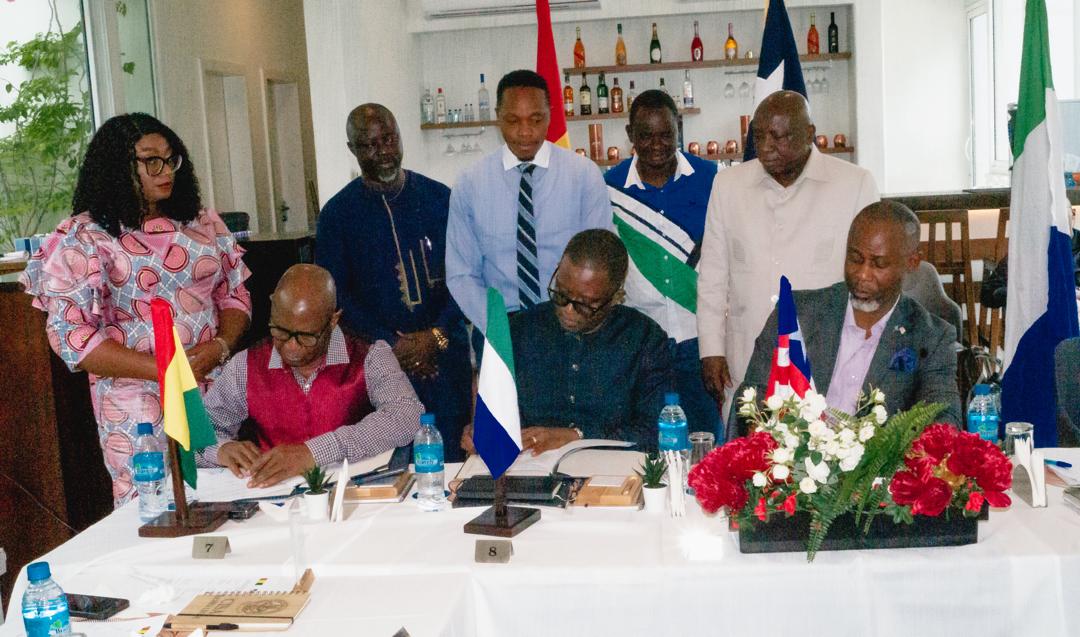In a landmark event, heads of intelligence services from Guinea, Liberia, and Sierra Leone have convened at the Lead Business Living Hotel at Aberdeen, in Freetown, to sign a Memorandum of Understanding (MOU) aimed at enhancing regional security cooperation.
The meeting, organized by the Central Intelligence and Security Agency (CISA) of Sierra Leone, is set to bolster intelligence sharing and operational collaboration within the Mano River Union (MRU) region.
The meeting commenced with a welcome address by Abdulai Caulker, National Security Coordinator of Sierra Leone. He emphasized the importance of the gathering and expressed gratitude to the key participants, including Major General (Rtd.) Prince Charles Johnson III, Director of the National Security Agency (NSA) of Liberia; Colonel Sekou Tidiane Camara, Coordinator General of the Guinean Intelligence Community (CGR), and Dr David Sengeh, the Chief Minister of Sierra Leone.
“Today’s meeting is a crucial step towards enhancing our collaborative efforts in addressing the multifaceted security challenges that we face. In an era where threats transcend borders, our ability to work together effectively is paramount,” Mr Caulker stated.
The Director-General of CISA, Ansumana Mohamed Idris, highlighted the strategic significance of the MOU and cited recent successful collaborations between CISA, CGR, and NSA, which led to the arrests of criminals and transfer of persons of interest across borders.
“This MOU is a testament to our resolve to face challenges together, to stand united against threats, and to ensure the safety and security of our citizens,” Mr Idris remarked.
The Director-General of CISA expressed confidence in the collective will of the three intelligence communities to achieve the goals set out in the MOU. He thanked President Bio for his support and acknowledged the contributions of international partners, particularly from the United States of America.
Major General (Rtd.) Prince Charles Johnson III, Director of NSA of Liberia,
emphasized the critical need for intelligence collaboration within the MRU basin, outlining the multifaceted challenges facing the region, including transnational crimes, rising insecurity, environmental threats, and political instability.
“Collaborative efforts that transcend borders and foster deeper cooperation and coordination among our intelligence communities are essential to safeguard our security and overall well-being,” he stated.
Colonel Sekou Tidiane Camara, Coordinator General of the Guinean Intelligence Community (CGR), expressed hope in the agreement to work together and further extended compliments of support from the Guinean government.
“This agreement is seen as a pledge to support one another, share vital information, and conduct joint operations when necessary”, he said, adding that the MoU represented a commitment to building trust and understanding between the agencies, enhancing operational effectiveness, and promoting regional stability
The Chief Minister of Sierra Leone, Dr David Sengeh, conveyed special greetings from President Julius Maada Bio and praised the collective will of the intelligence leaders. He emphasized the shared history and common challenges faced by Guinea, Liberia, and Sierra Leone, and underscored the importance of a collective security approach.
“The support from our sister countries in times of internal security challenges has been outstanding. This collaboration will help ensure that our country remains safe”, Dr Sengeh said.
He ended up by saying that Ivory Coast must be invited as a member of the MRU in order to have a full cover of the sub-regional body.
In his closing remarks, Abdulai Caulker, National Security Coordinator of Sierra Leone, urged the intelligence chiefs to approach discussions with an open mind and a collaborative spirit. “By working together seamlessly and innovatively, we can create a safer and more secure MRU for our citizens”, he asserted.
The high-level meeting focused on several key areas, including strengthening intelligence sharing; enhancing joint operations; developing unified strategies; fostering trust and understanding, and strengthening communication channels.


